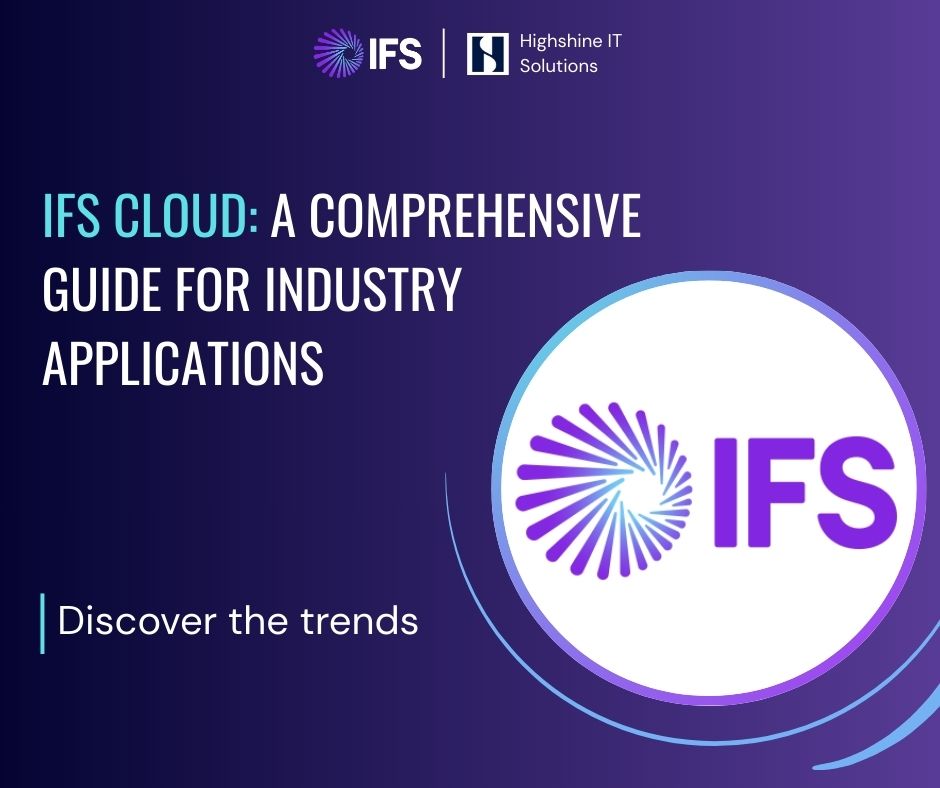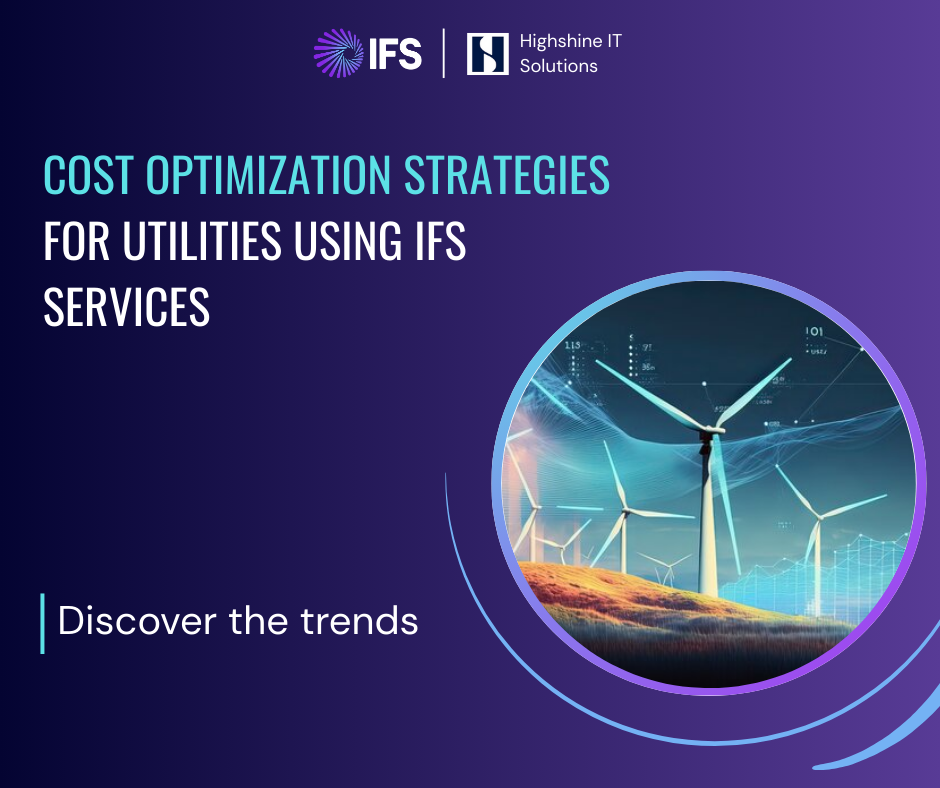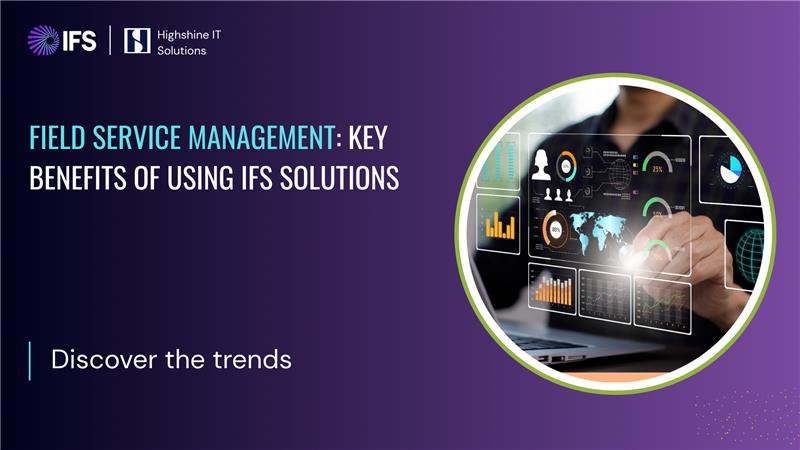What is IFS Cloud?
Picture yourself as the CIO of an enterprise with vast, asset-heavy operations – wrestling with legacy systems, uptime, compliance, and the pace of change. IFS Cloud is a flexible platform that brings together Enterprise Asset Management (EAM), Field Service Management (FSM), Enterprise Resource Planning (ERP), and project management into one system.
It features open REST/OData APIs for integrating with external systems and a role-based user interface, which enhances user-friendliness (Aurena/Lobbies). Additionally, it supports industrial innovation through embedded IFS.ai and is highly robust, as it is available both on mobile devices and offline.
To illustrate this adequately, here’s an example:
In a manufacturing unit, there are many sensors and transducers to track and monitor critical data. EAM + IFS.ai helps with predictive maintenance of critical assets. It tracks vibration/temperature data streams from pumps via REST APIs. IFS.ai flags anomaly risk; a work order auto-creates with parts reserved and a technician scheduled.
As a foreman or supervisor of the maintenance unit, the individual sees a Maintenance Planner Lobby card displaying "Assets at Risk", which can be clicked to access health trend charts and the prebuilt job plan.
This reduces the downtime in the manufacturing unit, thereby increasing efficiency and better output. Another benefit is that it is a great tool for safety compliance and audits.
Another use case can be to reduce the turnaround time for Maintenance, Repair, and Operations (MRO) in theaviation industry. (Projects + EAM + ERP)
To illustrate this adequately, here’s an example:
An aircraft arrives for a routine, scheduled light maintenance inspection. Scanning the tail number spins up a project work-breakdown structure from a template. Before work starts, the system makes sure you have the right materials, correctly calibrated tools, and valid certifications. During the inspection, if something unexpected is found, the system makes a new task and updates the project’s time and cost, so the schedule/cost impact is visible immediately.
This tight loop shortens turnaround time (TAT), reduces last-minute parts expedites, and helps ensure compliance findings are closed on time with a clean digital audit trail.
Where IFS Cloud is a great fit
IFS Cloud is a perfect fit for asset-intensive industries like manufacturing, mining, aerospace, aviation, and energy sectors. Since these industries are very critical from a resource allocation, safety, and capital standpoint, the slightest of downtime could cost a lot.
There can be safety hazards, thereby leading to compliance issues that, in turn, slow down the functioning of these industries.
With features like IFS.ai that monitor critical data in real time, the predictive intelligence that allows scheduled maintenance is a game-changer.
Where IFS Cloud is NOT a great fit
IFS Cloud is not a natural fit for commerce-first, light-operations businesses (e.g., D2C retail or subscription platforms) where shopfront, marketing automation, and CPQ matter more than assets or field service.
It can also feel heavy if you need ultra-deep micro-vertical manufacturing features, broad country localisations, or a huge third-party marketplace out of the box – expect more customisation.
If your main goal is to upgrade accounting or make company-wide reporting the star, you’ll likely be happier with software that specialises in accounting or a dedicated reporting tool. IFS Cloud’s built-in reports can work well, but they often shine most when paired with a separate reporting solution. And if you’re a very small team trying to keep costs low and start quickly, a simpler system will usually be faster and easier.
Application of IFS Cloud for the Energy Industry
Uptime and efficiency are crucial factors for energy companies. IFS Cloud’s predictive analytics can forecast equipment failures, allowing maintenance teams to act before downtime costs mount. Its asset management tools integrate with real-time monitoring systems, helping utilities optimize resource allocations. The result is fewer outages, reduced maintenance spending, and a more resilient energy infrastructure.
The IFS Cloud for the Energy Industry is a strong answer to the changing needs of energy firms. IFS Cloud improves both asset management and operational efficiency, which are both important for keeping energy systems running smoothly.
In practice, this process involves ingesting data from historian, SCADA, and IoT systems (using protocols like OPC UA and MQTT), applying condition rules and predictive models, automatically creating compliant work orders (including permits, crafts, and spares), dispatching them via FSM with offline mobile capabilities, and closing the loop in Lobbies.
Native support for linear assets, complex permits-to-work, and outage/turnaround projects ties maintenance to risk and capacity. This proactive strategy cuts downtime and maintenance expenses while strengthening resilience.
Cloud-based IFS in Manufacturing
Manufacturers often face production bottlenecks caused by fragmented systems. IFS Cloud connects shop-floor data with supply chain logistics, creating a single view of operations. With AI-driven demand forecasting, production schedules can automatically adjust to reduce waste.
What's the real-world impact? This leads to improved productivity, lower inventory costs, and faster order fulfilment.
The IFS Cloud for the Manufacturing Industry aims to enhance supply chain management and optimise production planning. Adding the IFS Cloud to existing systems in manufacturing organisations is simple, which makes it easier to switch to more efficient operations.
Operationally: integrate MES/PLC signals, BOM/route variants, and quality holds; feed IFS.ai demand to APS for finite schedules; peg materials and surface exceptions (late POs, capacity conflicts) in Lobbies.
It’s especially strong for ETO/MTO and hybrid shops where asset reliability and aftermarket service matter.
IFS Cloud for Service Industry Businesses
In service businesses, customer loyalty hinges on responsiveness. IFS Cloud enables dynamic scheduling and real-time resource tracking. For example, hospitality companies can manage bookings, adapt to guest preferences, and measure service performance in one platform. This translates to better customer experiences and measurable gains in retention.
IFS Cloud is a tremendous force multiplier in the service sector because it enables companies to manage resources efficiently and provides service managers with enhanced tools. The IFS Cloud platform makes it easy to plan and manage resources, which helps service providers deliver clients better experiences.
How it works:
The dynamic scheduling engine optimises for SLAs, travel time, skills, and parts; mobile technologies operate offline, capture time, materials, and asset states, and trigger warranties and entitlements. IoT events spawn proactive work, and contract rules drive billing. Use lobbies to track NPS, first-time fix, and margin leakage. For broad self-service analytics across non-service domains, pair with an external BI platform.
IFS Cloud for the Aerospace and Defence sectors
Few sectors are as complex as aerospace and defence. Compliance, supply chain risks, and project overruns are constant headaches. IFS Cloud unifies ERP, EAM, and project management, giving leaders full visibility over parts, suppliers, and milestones. That means reduced risk of compliance gaps and better control of multimillion-dollar projects.
The aerospace and defence sectors, which are characterised by the need to navigate complex projects and adhere to strict regulations, stand to benefit from the capabilities of the IFS Cloud platform.
Execution pattern: program WBS with earned value; configuration control (as-designed/as-built/as-maintained) for serialised parts; airworthiness/MRO libraries; tooling/calibration; export controls; and project-aware supply with long-lead items and ITAR/EAR gating. Line/heavy maintenance runs on digital task cards and offline hangar mobility, while Lobbies surface schedule risk. Note: specific certifications/local reports may require partner extensions.
IFS Cloud for the Construction Industry
Construction projects involve multiple stakeholders, strict timelines, and budget constraints. IFS Cloud integrates project management, finance, and EAM to provide end-to-end visibility over materials, equipment, and labour.
Real-time dashboards track project milestones, labour utilisation, and cost burn rates, enabling managers to identify delays and budget overruns early. For instance, a mid-size contractor leveraged IFS Cloud to improve on-time project delivery by 20% and reduce material waste by 15%.
On the ground: cost codes and progress measurements drive earned value; change events reforecast; progress billing, retention, and holdbacks are native. Treat equipment fleets as first-class assets (maintenance, utilisation, fuel). Mobile field service captures QA/HSSE checklists, photos, and materials on site (offline). Procurement workflows align POs, deliveries, and site inventory to reduce idle plant and rework; BIM links enable 5D cost control.
IFS Cloud for the Telecom Industry
Telecom operators must manage vast networks and meet the dynamic demands of their customers. IFS Cloud's network asset management capabilities allow real-time monitoring of tower, switch, and fibre assets. Predictive maintenance reduces downtime, while integrated workforce management guarantees the timely dispatch of field technicians with the appropriate parts.
With AI-driven demand analytics, telecommunications providers can forecast peak usage and optimise their capacity plans to avoid congestion. For example, a regional operator used IFS Cloud to reduce service-affecting outages by 30% and cut technician dispatch time by 25%.
Operational blueprint: model towers/fibre routes, permits-to-work, and spares; integrate OSS/BSS for orders and trouble tickets; constrain scheduling geospatially for first-time-fix; and rely on offline mobile for rural crews. Keep IFS as the operational backbone for assets, workforce, and work—pair with specialist OSS where deep NOC analytics or spectrum engineering are required.
Conclusion
In summary, IFS Cloud demonstrates remarkable adaptability across various sectors, offering numerous operational advantages. It enhances adherence to regulations, streamlines processes, and boosts customer contentment across multiple sectors.
IFS Cloud empowers organisations to implement significant transformations in their operational practices. It provides them with the insights and autonomy necessary to function efficiently in a market that is becoming progressively more competitive. Organisations that have not yet integrated this technology should consider the potential benefits it can have for their operations.






